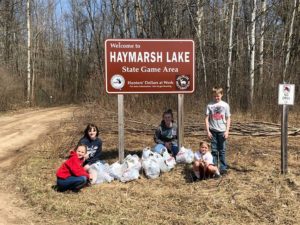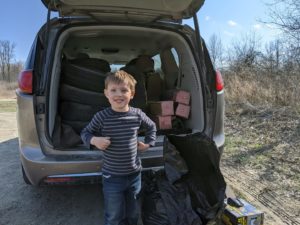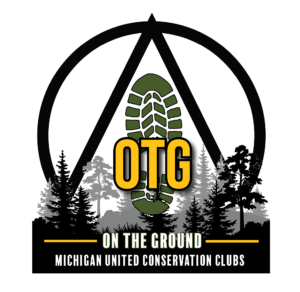Michiganders Continue to Care for Public Lands Despite Volunteer Event Cancellations
 Even as Department of Natural Resources (DNR) and Michigan United Conservation Clubs (MUCC) volunteer events are being canceled across the state due to the public health concerns surrounding COVID-19, Michiganders are still stepping up to take care of their public lands.
Even as Department of Natural Resources (DNR) and Michigan United Conservation Clubs (MUCC) volunteer events are being canceled across the state due to the public health concerns surrounding COVID-19, Michiganders are still stepping up to take care of their public lands.
When the first COVID-19 restrictions were put in place, MUCC members and former On the Ground (OTG) volunteers inquired about what they could continue to do to improve the lands and waters they love while practicing social distancing. Inspired by their ideas and suggestions, MUCC’s OTG program recently launched a virtual public land clean-up initiative that encourages individuals who are already out recreating responsibly to leave their public lands better than they found them by removing litter or trash observed. By sharing their good public land stewardship with the OTG program and following the project guidelines, individuals are entered into a random drawing to win one of two $50 Cabela’s gift cards (click HERE for more information).
Launched on April 2, 2020, this initiative has given individuals and families the opportunity to give back to their public lands while recreating outdoors and practicing social distancing. Many individuals share photographs and short stories about why they have chosen to participate in the effort, often citing a love of the resource, their unfavorable opinion of littering and the positive opportunity to give back to public land that they live near. State game areas, state forests, Grouse Enhanced Management Sites, access sites, wildlife management areas and wildlife viewing areas have all benefited from the stewardship efforts of Michiganders in the past two weeks.
 Few things could shed a more favorable light on the quality of character displayed by Michigan’s outdoorsmen and outdoorswomen than the selflessness captured by this virtual clean-up effort. The OTG program has long been an outlet for hunters, anglers, trappers and all outdoor enthusiasts to give back to their natural resources, and it is impressive to see people across Michigan stepping up to volunteer for their public lands as individuals when we cannot gather as a conservation team. In order to continue the legacy of conservation in our state, including one’s family and friends in conservation-minded activities is critical. Teaching them to hunt, fish or trap are all important components of preserving our outdoor heritage, but teaching them to give back to their natural resources is paramount.
Few things could shed a more favorable light on the quality of character displayed by Michigan’s outdoorsmen and outdoorswomen than the selflessness captured by this virtual clean-up effort. The OTG program has long been an outlet for hunters, anglers, trappers and all outdoor enthusiasts to give back to their natural resources, and it is impressive to see people across Michigan stepping up to volunteer for their public lands as individuals when we cannot gather as a conservation team. In order to continue the legacy of conservation in our state, including one’s family and friends in conservation-minded activities is critical. Teaching them to hunt, fish or trap are all important components of preserving our outdoor heritage, but teaching them to give back to their natural resources is paramount.
A large thank you to all of you who are using this time to recreate responsibly and close to home, all while leaving the land better than you found it in the process. Please visit mucc.org/on-the-ground or facebook.com/muccotg for more information about our award-winning OTG program and to learn how to get involved in our virtual public land clean-up challenge.

Supported by the Michigan DNR Wildlife Division, On the Ground is MUCC’s volunteer fish and wildlife habitat improvement program. More than 3,000 volunteers have improved fish and game habitat through weekend projects across Michigan since 2013.
Recent Posts



